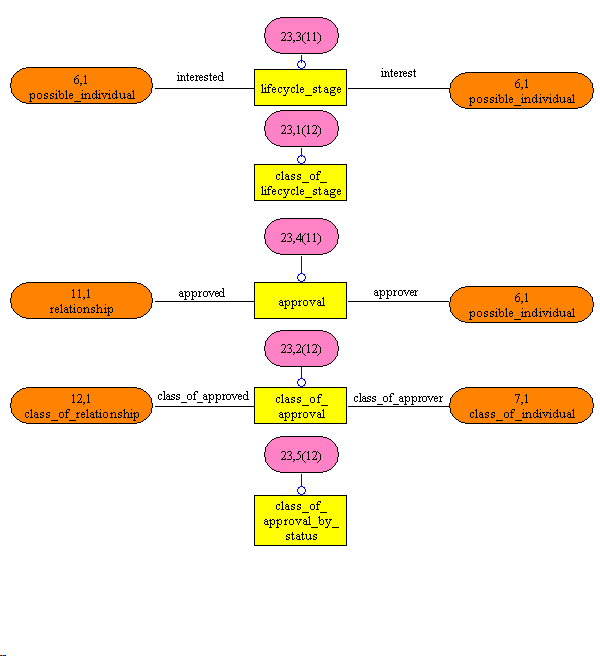Dear John,
Hi Mathew,[MW>] (Matthew)
Thank you for your patient explanations. On the list just last week was an exchange about namespace identifiers, and it was claimed there is no semantic definition for such; well, 15926's LeftNamespace and RightNamespace proves that assertion wrong I guess.
[MW>] No, I’m afraid not. ISO 15926 treats strings as first class objects that can be used to represent other objects. The semantic connection comes from the relationship, not the strings themselves. This bit of the model is just about string processing.
As for reuse, my understanding about First Order Logic is that all properties are requred to be predicators;
[MW>] This is not true. It is for example quite permissible to make Classification a predicate, and associate all you properties to objects using the classification predicate.
15926's are not -- instead they are all camelcased phrases, predicatorNouns, as is the common practice elsewhere.
[MW>] Well the format is usually defined by the language/tool used, many of which use space as a separator, so you need to use e.g. camelcase or underscores to make multiword terms readable.
It is one's use of those nouns in object properties in my opinion that eliminates reuse of very substantial bodies of work like 15926. But as you say 15926 had no design intention for reuse, that to the extent it occurs is pure serendipity.
[MW>] That is incorrect. ISO 15926 was defined for reuse, just not for piecemeal reuse I combination with other ontologies. It has been reused as intended (usually subsets) and it has also been reused in a piecemeal way with other ontologies – despite that not being the design intent – only that last was serendipity.
But if 15926 were constrained to use predicators for all relations, I'd expect its reuse to be less random.
[MW>] Actually I disagree. I think that defining just one or two predicates like classification has made it much easier to create a regular and more portable ontology, though that was not why we did it. ISO 15926 was originally created using entity relationship models, and other considerations lead to us taking the particular approach we did, in particular that one entity type cannot be a member of another.
In fact it would then conform to the rule that FOL predicates are predicators not nouns. I mean all predicators, no nouns. Said differently, here's the rule: no nouns, only predicators.
[MW>] That is OK as long as you can say what a predicator is. I have struggled to get a good answer to that question from even the wisest heads on this forum. My take is that predication is the same as classification as near as makes no difference, but I suspect there is some slight difference.
Why is this good valid rule with many beneficial consequences violated, even by RDFS?
[MW>] It’s not FOL, that’s why.
So often the 'noun' in the object property is exactly the Class referenced by the rdfs:range for the object property -- 15926 does that rather consistently. Hmm, let's go further and name properties per their domain too! "domainPredicatorRange" -- just what we did in the bad old days of C data structures, prefixing members with the name of the structure, sometimes with the predicator "is" and sometimes with "has" all separated with underscores.
[MW>] That would be a mistake, the role played by the range would be more appropriate – which is what we do in ISO 15926.
But we're semanticists now, so let's not be caught with properties like "approval", much better to say "hasApproval" -- at least we're not saying "designApproval" or "designHasApproval" or several others. It's got the predicator in there, so what's the damn problem?
[MW>] As I said the original is approval and class of approval. You will find both the range and domain, and the role played them also there. You should do your homework before you offer criticisms.

Oops, here's the problem:
Forgetting the rules = Having no rules = No reuse.
[MW>] Which might mean something if anything you said above was correct. So I wonder how you account for ISO 15926 having been reused on some hundreds of projects over the last 10+ years?
Regards
Matthew West
Information Junction
Mobile: +44 750 3385279
Skype: dr.matthew.west
matthew.west@xxxxxxxxxxxxxxxxxxxxxxxxx
http://www.informationjunction.co.uk/
https://www.matthew-west.org.uk/
This email originates from Information Junction Ltd. Registered in England and Wales No. 6632177.
Registered office: 8 Ennismore Close, Letchworth Garden City, Hertfordshire, SG6 2SU.
Thanks/jmc
